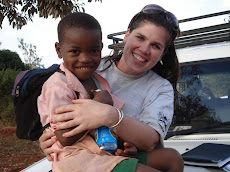
Yesterday I was back in Eastern Kenya visiting one of our development projects in Mutonguni, with
Helen Keogh, World Vision Ireland Chief Executive and my boss.
It was baking hot and very dusty. The last three rainy seasons have failed and there’s not a blade of grass for miles. The key focus of our work here is water and sanitation and we’ve already brought clean, safe water to hundreds of households. This saves women and girls from walking for miles to fill up a 20 litre jerry can of water and then lugging it back (collecting water is typically considered women’s work) .
Marriage Proposal
The community like to tease me, asking me to marry one of their sons. I tell them, with all honesty, I would make a useless wife. I doubt I could make the 10km roundtrip with 20 litres of water weighing me down for half of it. Not to mention the farming and childrearing.
Irish Accent
The other thing I get teased for is my accent – the school health club at Mutonguni Primary School find it hilarious.
As I’m chatting with them some of them start imitating my accent by holding their noses. Apparently us wazungu (white people) sound nasal, like – and I quote – “we are picking our noses”. Charming.
Health and Hygiene
I manage to get over this though as the chairman of the school health club, 14 year old Gitari Kagendo, tells me how they have been promoting health and hygiene (e.g. handwashing) to their peers and the community.
World Vision Ireland, with the help of
Irish Aid, has supported the construction of pit latrines, hand washing facilities and 2 rainwater harvesting tanks in the school.
This has helped reduce school absenteeism caused by diarrhoea and other water borne diseases. They’ve also established a vegetable patch with some seeds we gave them and vegetables are a regular part of the school lunches now.
At the end of the visit, I’m sorry to leave but glad to be able to report that there’s some fantastic work going on in Mutonguni.













